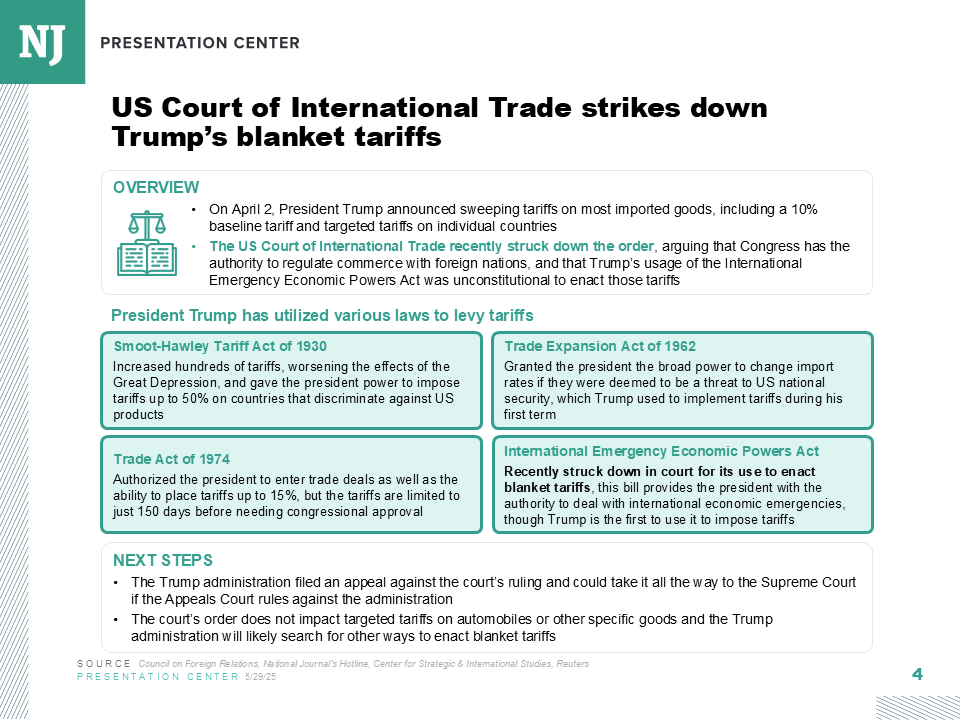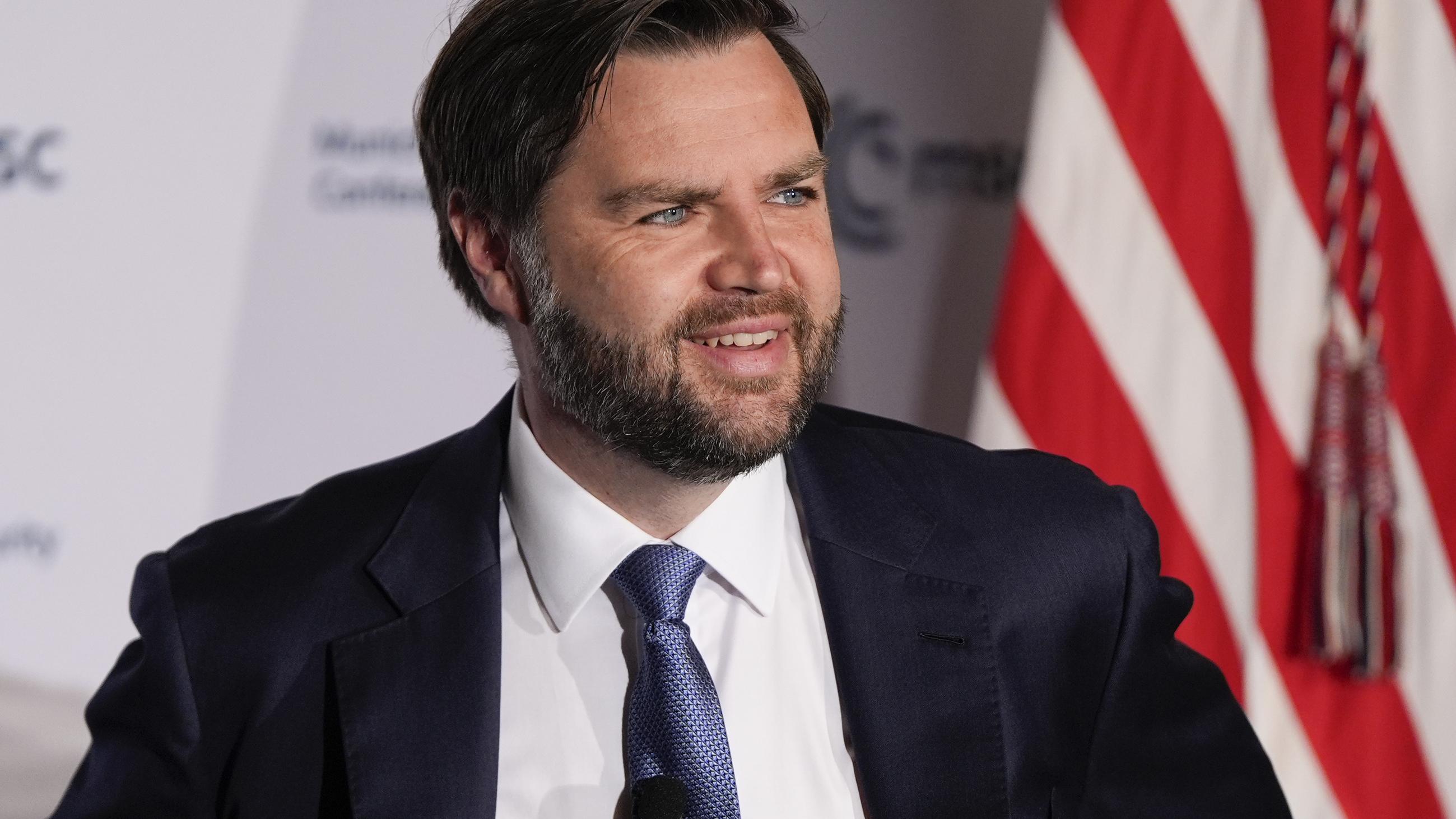Anna Bryłka is a member of the European Parliament from Poland, and a member of the far-right Patriots for Europe, which became the third largest political group in the European Parliament after the June 2024 elections. She’s also a member of the Parliament’s Committee on International Trade. Bryłka spoke with Cristina Maza during her committee’s recent trip to Washington about EU-U.S. relations and the ongoing trade negotiations. This interview was edited for length and clarity.
Can you tell me about your trip to Washington?
We’re traveling with the International Trade Committee of the European Parliament. Our delegation is made up of representatives of different European Union member states and different political groups.
I am from the Patriots for Europe, a right-wing group in the European Parliament, and I’m from Poland. But we have representatives from the [center-right] European People’s Party; the socialists; Renew, which is a [centrist, pro-European] liberal group; and [the European Conservatives and Reformists], another conservative group in the Parliament.
That’s because trade policy is a common policy in the European Union. The European Commission decides—not the member states—on trade agreements. Europe is negotiating now with the United States. Around one week ago, U.S. President Donald Trump said he wants to impose a 50 percent tariff on goods from Europe. However, after speaking with Commission President Ursula von der Leyen, he delayed that decision. The deadline to reach an agreement is now July 9th.
We had numerous meetings with various think tanks and European officials working in Washington. We had good discussions with Republican state senators from Kentucky, Mississippi, and Utah, including Phillip Wheeler, Briggs Hopson, and Wayne Harper. We also had a very interesting meeting with the Department of Agriculture. One of the biggest problems is related to agricultural products. In the United States, there are different standards for producing food. In Europe, we don’t use as many pesticides and hormones.
Can you describe the role of the European Parliament in trade negotiations?
We are very involved in the legislative process. We will prepare amendments to the agreement, we vote in our committee, and we prepare voting among our group in the plenary session. We need to ratify any [trade] agreement that is reached. It will go through us, the Parliament, and the European Council, which is the 27 ministers from the member states.
We are part of the European Parliament, so we don’t have a mandate to negotiate. Only the European Commission has that mandate. But we have tried to get an idea of the thinking in the United States. We understand the Trump administration’s views on the deficit. We understand that the Trump administration aims to bring industry back to the United States, creating new jobs. That’s clear. But Europe will be the victim of that policy.
What are the points of consensus between Europe and the U.S.?
We discussed our relationship with China. That’s a big geopolitical issue. In the European Union, we put tariffs on [electric] car imports from China. We have a big problem with Chinese products. There is unfair competition with European products. They have lower energy prices in China. In Europe, we have the highest energy prices in the world. We have problems with the competitiveness of our economy.
We import a lot from China. That has increased very fast in recent years. A lot of products that were usually European are now Chinese. We have too many Chinese imports. Many European industries have relocated outside the European Union due to climate, tax, and energy policies. Many industries go to Turkey, India, and China. We import too much, and there’s unfair competition, because in China industries are subsidized, they have lower wages, energy prices are lower, and people work 10, 11, or 15 hours per day.
For example, my group is against the European Green Deal. We understand that these climate goals, for instance, include the goal of reducing emissions by 90 percent by 2040. In my opinion, it’s not possible to do that. We believe this will destroy our economy and erode our competitiveness. For example, the Trump administration changed its policies toward natural resources. He’s focused on natural resources and not climate policies.
We tried to convey that we have the same position toward China as the United States. We want to work together, not necessarily against China, but we share the same values as the United States, such as democracy and freedom of speech.
In Poland, we remember what communism and socialism are. China is a communist country without freedom of speech, without human rights and things like that. We can close our eyes, but they have different values. Of course we need trade relations with China, but we prefer to be independent. We don’t want to depend on Russian energy or Chinese products. We have to produce also in Europe.
We wanted to convince people that we should work together to come up with a solution to these trade issues.
Do you get the impression that the Trump administration is hostile to the European Union?
I agree with the Trump administration that we in Europe have many non-tariff barriers. But these non-tariff barriers also apply to European producers. We pay a climate tax. We have a lot of bureaucracy.
Commission President von der Leyen doesn’t understand that she needs to be in closer contact with the Trump administration. Our relationship is the most important. We export a wide range of products to the United States. In my opinion, the anti-Trumpism is stronger than the approach to negotiations.
Didn’t she speak with Trump recently and secure an extension of the trade negotiations?
Yes, but Trump has been president since January 20th. She didn’t come to Washington to meet with him. She’s a little too distant, and it’s a problem for the European economy.
We have observed that the Trump administration wants to talk more with national leaders like France’s Emmanuel Macron or Italy’s Giorgia Meloni. The European Union has a very big crisis in leadership. Von der Leyen’s decisions are unpopular in European society. She is weak, but she is in charge of many decisions.
A lot of people from the Trump administration criticize the European Union, not Europe or European countries. They understand Europe’s history and its values. We built our countries on the same values as the United States. I agree with a lot of the Trump administration’s criticism about the freedom of speech and the crisis of democracy in Europe.
It’s a crucial time for a trade delegation to visit Washington, given the developments in the negotiations and the subsequent court rulings on tariffs. What are the main topics in the ongoing negotiations?
The agricultural sector and tariff rates. Commission President von der Leyen proposed zero-for-zero tariffs, but we understand that this is not possible.
We want something similar to the U.S.-United Kingdom trade agreement, where a general agreement was released and the details will be finalized later. I think that’s the negotiating strategy, to go step-by-step.





